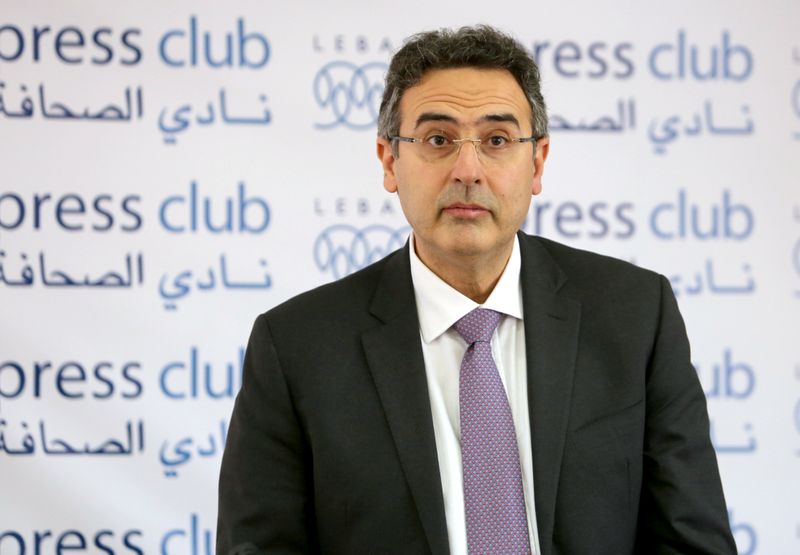
A key member of the Lebanese government team negotiating a bailout from the International Monetary Fund resigned on Monday, the second official to quit this month as authorities struggle to come together to save an economy in free fall.
The Finance Ministry’s director general, Alain Bifani, said he’s leaving to protest the government’s handling of the country’s worst financial meltdown in decades. Bifani, who’s been in the job since 2000 and also sits on the board of the central bank, follows the departure of Henri Chaoul, an adviser to the Finance Ministry.
Bifani has played a pivotal role in drafting the government’s rescue plan and faced accusations of taking a hard line on local lenders as the central bank and the government clashed over the scale of losses in the financial system — a crucial issue in Lebanon’s talks with the IMF. Bifani will hold a news conference later in the day to discuss the reasons behind his unexpected move.
“My decision is meant to protest the way everyone in power has handled the crisis,” Bifani told Al Jadeed TV. “The path that we’re taking today is reckless.”
Officials are in talks with the IMF for a $10 billion loan program after the government defaulted in March on a Eurobond repayment. It seeks to restructure its entire debt of $90 billion and overhaul an economy that’s seen its currency plunge on the black market with unemployment and poverty rates surging.
At Loggerheads
But the government has come under heavy scrutiny from lawmakers, lenders and the central bank for a plan it had drafted with the help of its financial adviser, Lazard Ltd. It estimates total losses incurred by the government, lenders and the central bank at $69 billion — three times Lebanon’s total economic output projected for this year.
To plug some of that hole, it envisages debt haircuts that would wipe out lenders’ capital and require a shareholder bail-in while protecting most depositors.
The divisions also prompted Chaoul to quit earlier this month and accuse the political class of colluding with lenders to torpedo a deal that would require them to pay the price for bankrupting the state. Bifani and Chaoul were two of three members of a Finance Ministry team taking part in the government’s talks with the IMF.
Bifani has insisted that government’s numbers were correct and has criticized the way others have calculated the losses.
Currency Chaos
Lebanon has been struggling with a severe dollar shortage since inflows from citizens overseas dried up as the country’s political and economic crises deepened last year, prompting lenders to at first limit withdrawals and then effectively stop dispensing the greenback. That’s sparked a surge in rates on the black market, which has recently accelerated to nearly 8,000 per dollar, compared with the official rate of 1,507.5.
Just as news of Bifani’s resignation emerged, security forces were reopening a road in north Lebanon that was blocked by protesters over the collapse of the currency and deteriorating living conditions.
Local lenders allowed clients on Monday to withdraw dollars in local currency at a weaker rate than the one set in April, bankers said.
The central bank in April said customers could withdraw dollars at the market rate, which was later set at 3,000 pounds. At the time, the circular led to a sharp depreciation of Lebanon’s currency.
Prime Minister Hassan Diab has repeatedly blamed the central bank for failing to inject enough dollars in the market to stem the collapse. Lebanese inflation has meanwhile soared to levels last seen in the aftermath of the country’s civil war three decades ago.
The government has tried to stabilize the pound, detaining money changers and drawing up a stricter plan to deal with what officials call “greed” by food traders
Different approach needed
He said during his press conference following the announcement of his resignation that negotiations with the International Monetary Fund were not dead but a different approach was needed..
Earlier today Bifani told al-Jadeed the path being taken by Lebanese leaders was reckless and would hurt the people.
No quick fix
International Monetary Fund Managing Director Kristalina Georgieva said on Friday she does not yet have reason to see a breakthrough in negotiations with Lebanon to help resolve the country’s economic crisis.
Georgieva told a Reuters Newsmaker webcast event that IMF officials continue to work with Lebanon, but it is unclear whether the country’s leaders, stakeholders and society can unify around reforms needed to stabilize its economy and return it to a growth path.
“The core of the issue is whether there can be a unity of purpose in the country that can then carry forward a set of very tough but necessary measures,” Georgieva said. “All I can say is that we are putting our best people to work with Lebanon, but we do not yet have a reason to say there is a breakthrough.”
BLOOMBERG/YL/REUTERS

Leave a Reply
You must be logged in to post a comment.